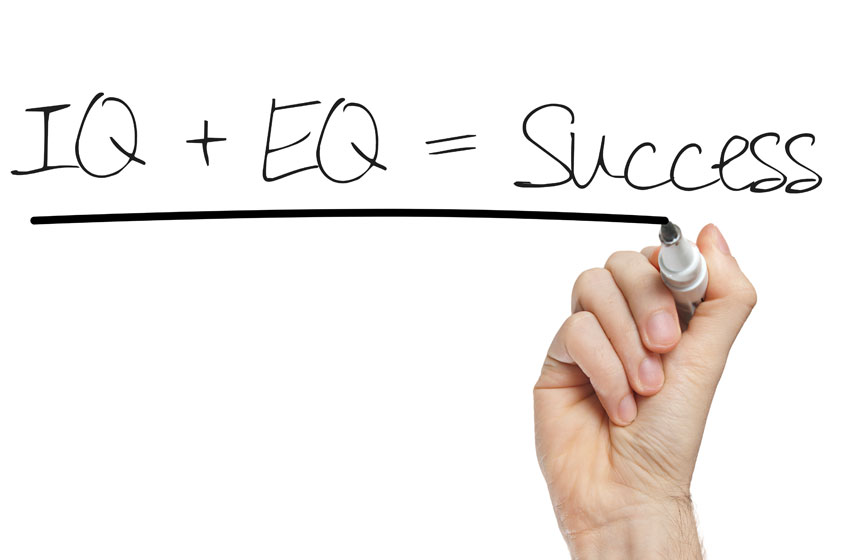Curbing stress through emotional intelligence

Editor – Mr. Dushyant Gupta
As a result of the pandemic, many people were confined to their houses, away from social events/gatherings and exposure. It was first accepted, but it soon became problematic. With more individuals introspecting and spending a lot of time with themselves, the amount of time spent on offline work progressively decreased. With more and more individuals adjusting to this “new normal,” the pandemic generated an existential experience.
As constraints loosened, offices began to reopen, easing individuals into their later years but with care. Many people feel such a need to brush up on social competencies after working or interacting electronically for so long. However, there is still a concern because the pandemic’s consequences, such as burnout, are still present.
Burnout – Explained
Mental health used to be taboo, but that is no longer the case. Naomi Osaka, a Japanese tennis player, and Simone Biles, an American artistic gymnast, are two notable instances of athletes who have dropped out of their respective competitions to focus on mental health. Everything that has transpired since March 2020 has been a lot to deal with, and most folks are still mending as they go on.
Burnout is caused by prolonged, uncontrolled work-related stress, according to the World Health Organization (WHO). According to a Gartner poll, nearly half of the worldwide workforce suffered health problems between Jan 2020 and March 2021. In a March 2021 SHRM poll, 48 percent of American employees said they were emotionally and physically weary at the end of each day working from home has effectively made many people more content in their surroundings by safeguarding them inside their private safe area, where external intervention is limited. Working from home, though, presented its own set of difficulties.
Revenue and improved organizational performance are the ultimate goals of any business. Currently, these organizations recruit or finance people who are willing to go above their limits and bring honor to their organizations. However, as a result of this, the strain on employees increases to the point that they become burned out as a result of the workplace.

‘Job Burnout’ is the most common kind of burnout. In a high-pressure workplace, it’s a common occurrence. If not addressed promptly, this state will have disastrous consequences for employee productivity, eventually leading to more extreme burnout and ultimately affecting the performance of the organization. Worker well-being is still a hot topic in the workplace, and it’s an important pillar that can’t be overlooked.
Psychology is a science that is underappreciated. It may not have scientific backing, but understanding the brain’s interactions with the body and the environment is inadequate without taking it into account. Maintaining a work-life balance is difficult, yet it is a necessary ability since one’s health is at stake. Stress consciousness is the first step in the direction of burnout. Emotional Intelligence is often regarded as a useful tool for coping with burnout, but is there a relationship between its psychology with work-related stress or burnout?
Emotional Intelligence – The essentiality
Emotional intelligence is usually described as the ability/propensity to recognize/concede one’s emotions in various situations, as well as the variables that influence these emotions, and to use this knowledge to one’s benefit. Emotional Intelligence can help with this. According to studies, Emotional Intelligence has a direct influence on job-related burnout.
According to the findings of several studies, the Emotional Quotient (EQ) is more significant than Intelligence Quotient (IQ) in today’s society. Nowadays, a larger emphasis is placed on the social as well as emotional aspects of everything, including the workplace. As a result, it’s critical to value the Emotional Quotient as much as the Intelligence Quotient.
Emotional Intelligence is made up of five components. To properly cope with stress and burnout, one must attempt to master these components. Self-awareness, impetus/motivation, self-regulation, social and interpersonal skills, and compassion/empathy are among them. Emotional Intelligence Skills may be developed by innovating on these important components.
Self-awareness, as well as self-regulation, work together to empower a person. These aspects enable a person to understand their own strengths and weaknesses. They help people anticipate emotional outbursts and respond logically in emotionally difficult circumstances. Individuals’ emotional states have a significant impact on their decision-making. Due to heightened emotions, an individual may become feeble or fail to comprehend others’ emotional responses when he or she should. As a result, self-regulation is critical for making reasonable and sensible decisions.
In down periods, motivation is vital to keep morale up. Motivation has a largely positive influence on job progress and commitment. Motivated people are more productive than naysayers, according to studies. One of our primal instincts is emotional and social skills. They may not directly affect survivability, but it is undeniable that good social skills make it easier to survive and succeed in a competitive workplace.

Self-awareness, self-management, as well as relationship management, are some examples of emotional intelligence (EI) skills. People acquire these talents as they navigate their personal and professional lives. Collaboration, for illustration, is a relationship management ability that is essential when working with others. It’s tempting to assume the worst, but using EI helps you to analyze the facts and figure out what’s in your control vs what’s not. People, not only those in leadership roles, have begun to value EI abilities.
There is a great need as well as demand for people to acquire and enhance their emotional intelligence abilities throughout their lives and professions. As employers hire more people and offices reopen, it’s more important than ever to be mindful of workplace stress and how EI may help prevent burnout.
Extinguish Burnout with Emotional Intelligence
Emotional intelligence abilities aid in the consideration of stress in the workplace. Individuals are constantly using their EI talents without even recognizing them. According to Harvard Business Journal, self-management includes adjusting to changing surroundings. Individuals traversed the distant work gap to discover new methods to engage with teams when offices shuttered and serendipitous desk-side talks vanished; here is where relationship management came into the picture.
Those of us with a higher EI were better able to adjust, whereas others failed terribly. When it comes to coping with work-related stress as well as avoiding burnout, practicing EQ can help you manage stress and avoid burnout. Self-management is the process of determining a plan of action or a remedy in response to stresses. An important element of Emotional Intelligence is social awareness as well as relationship management abilities, which aid in assisting others who may be stressed.
To assist employees, a caring and sympathetic workplace culture are essential. It produces a healthier atmosphere where everyone participates and flourishes, favorably influencing the company’s growth. Everyone in a firm, regardless of experience or tenure, should work together to spread a healthy culture. Regular training and awareness workshops with experienced psychologists and counselors might help achieve this. Workers should be motivated, and their minor accomplishments should be recognized. The employer should strive to see the bright side of the problem and, even in difficult circumstances, encourage and respect his or her staff.
We’re all under our own paths, and we’re all vulnerable to stress. Each of us has the ability to put out the fires of burnout before they start, but doing so requires using EQ as a component of self-exploration to identify a cause and an action plan. All should be urged to assess their EI skill set and work to improve those skills. Stress in professional and personal life is unavoidable at times, but people may handle it or seek assistance with EI. Thriving, as previously said, is the cure to burnout.





